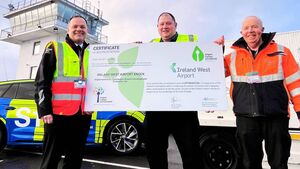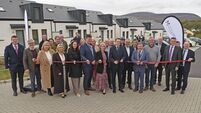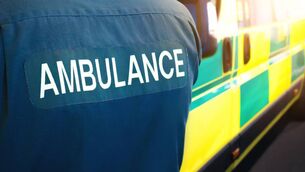Airport embarks on major initiative to reduce carbon emissions

Pictured with the Level 3 from left to right, Pearse Concannon, Chief Fire and Security Officer, Ireland West Airport, Gary Ginty, Property, Infrastructure & Sustainability Programme Manager, Ireland West Airport, Kieran Boyle, Head of Ground Services, Ireland West Airport
Ireland West Airport has recently lodged a planning application to develop and install a new solar farm on a site at the airport, which will provide more than 40% of the airport's annual electricity demands. The airport is also committed to developing electric car charging infrastructure to meet public demand for vehicle charging into the future and also plans to improve the thermal efficiency of the main terminal building by conducting insulation and fabric upgrades and introducing air lock zones along with running information sessions for its employees to encourage energy efficiency improvements across all airport operations.
Ireland West Airport has achieved Level 3 Accreditation, ‘Optimisation’, in recognition of the airport’s actions to address its CO2 emissions, as part of the global aviation industry’s response to the challenge of climate change.
Achieving Level 3 Accreditation is in recognition of the airport's exemplary work in reducing its carbon emissions and engaging other stakeholders to do the same.
Airport Carbon Accreditation is the global standard for carbon management and emission reductions at airports. This certification programme, specifically designed for airports, has received widespread support and endorsements from both the EU and the UN agencies responsible for civil aviation (ICAO) and climate change (UNFCCC). Launched in June 2009, the programme has six levels of accreditation: Mapping, Reduction, Optimisation, Neutrality, Transformation and Transition.
Participation in the Airport Carbon Accreditation Programme plays a significant role in the advancement of the airport’s overall sustainability strategy. To meet the demands of sustainable development and to safeguard the environment, Ireland West Airport embarked on an extensive sustainability and energy reduction programme in the last three years and has introduced a comprehensive energy and environmental management system as well as completing several new initiatives such as:
* Upgrading all terminal and external facility lighting to LED;
* Replacing its ground operations vehicles with a fleet of new fully electric, zero-emissions vehicles;
* Upgrading its airfield ground lighting (AGL) to the latest in LED technology, which will provide for the next generation of airfield ground lighting;
* Completing an upgrade of its runway distance measuring equipment (DME). Aircraft can use the DME simultaneously for landings and in conjunction with the instrument landing system (ILS), an “instrument landing” is provided which greatly increases efficiencies for aircraft.
* Upgrading its IRVR equipment (instrumented runway visual range). IRVR equipment is located along the edge of the runway and provides air traffic control and pilots with information on visibility for landings and take-offs. This equipment is needed for landing/take-offs in low visibility (fog) conditions. Upgrading the IRVR system reduces significantly time delays as well as fuel use.
* Completing an upgrade of the airport's constant current regulators with new pure sine wave CCRs which are specifically designed for LED light fittings. New sine wave CCRs in conjunction with the LED fittings will greatly reduce the consumption of the airport’s airfield lighting.
Airport Carbon Accreditation is an annual certification programme and consequently requires ongoing commitment to sustainability and continuous improvements from year to year.
At present, there are over 600 airports in 89 countries globally which are Airport Carbon Accredited at various levels of the programme. Airports accredited to date handle 53.4% of global passenger traffic each year.
Commenting on the Level 3 award, Gary Ginty, Property, Infrastructure and Sustainability Programme Manager, Ireland West Airport, said:
“The airport is delighted to have achieved the Level 3 accreditation award which is in recognition of the airport's exemplary work in reducing its carbon emissions. This accreditation marks another major milestone as we progress towards Net Zero emissions and build upon the important work already done through our sustainability strategy.
"Our aim is to continue to reduce carbon emissions at the airport and to work to ensure that the airport can continue to grow sustainably into the future while protecting the environment and in turn minimising our climate impact. We’d like to recognise the role our airport staff and colleagues, airlines, airport partners, and suppliers have played in this and thank them for engaging with us as we work to better understand and reduce emissions across our airport and beyond. Our interim pledge is to achieve carbon neutrality by 2030 as we work collectively to support aviation’s green transformation and achieve a ‘net zero’ position by 2050."
Brian McKavanagh, Business Development Director at Atkins Réalis, said: ‘’We are delighted to have contributed to this landmark achievement which paves the way for Ireland West Airport to achieve higher levels of accreditation. We will continue to leverage our global sustainability and environmental expertise to support Ireland West Airport on its journey to net zero."
Olivier Jankovec, ACI EUROPE Director General, said: “Congratulations to Ireland West Airport for taking this significant step towards decarbonising the airport’s operations and infrastructure. Achieving Level 3 ‘Optimisation’ is of critical importance for future progression to higher levels of carbon management and to playing an active role in the climate challenge. I look forward to cheering the Ireland West Airport team on in their journey to net zero.”





